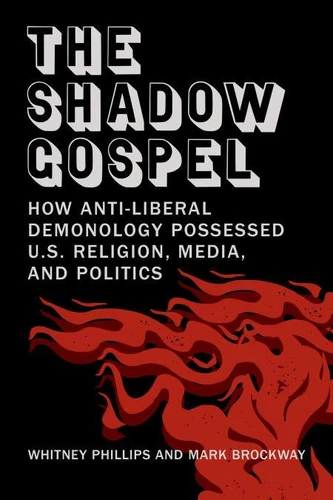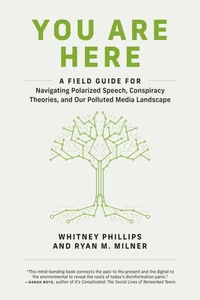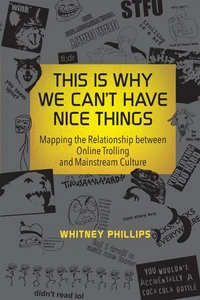The Shadow Gospel. How Anti - liberal Demonology Possessed U.S. Religion, Media, and Politics
Par : ,Formats :
Disponible dans votre compte client Decitre ou Furet du Nord dès validation de votre commande. Le format ePub protégé est :
- Compatible avec une lecture sur My Vivlio (smartphone, tablette, ordinateur)
- Compatible avec une lecture sur liseuses Vivlio
- Pour les liseuses autres que Vivlio, vous devez utiliser le logiciel Adobe Digital Edition. Non compatible avec la lecture sur les liseuses Kindle, Remarkable et Sony
- Non compatible avec un achat hors France métropolitaine
 , qui est-ce ?
, qui est-ce ?Notre partenaire de plateforme de lecture numérique où vous retrouverez l'ensemble de vos ebooks gratuitement
Pour en savoir plus sur nos ebooks, consultez notre aide en ligne ici
- Nombre de pages326
- FormatePub
- ISBN978-0-262-38301-1
- EAN9780262383011
- Date de parution15/04/2025
- Protection num.Adobe DRM
- Taille799 Ko
- Infos supplémentairesepub
- ÉditeurThe MIT Press
Résumé
A novel account of the culture wars and Evangelical influence in the United States that traces the 80-year rise of a quasi-religious anti-liberal demonology. When people talk about the chaotic, increasingly precarious political landscape in the United States, they often blame polarization and the culture wars. In The Shadow Gospel, Whitney Phillips and Mark Brockway tell a very different story. Analyzing eighty years of densely overlapping religious and secular messages preaching the dangers of liberalism, the book argues that the fracture and chaos in U.
S. politics isn't the result of a clean split between left and right. Instead, it's a split between the shadow gospel's quasi-religious anti-liberal demonology-the vague sense that an evil leftist force is threatening to destroy American society-and the people accused of being the liberal devil. A shadow gospel framework helps contextualize the violence of January 6, 2021, the fervor of Satanic conspiracy theorizing, and the crusade against "wokeness" and LGBTQ existence.
But it also helps explain the most vexing elements of our politics: that the most potent source of religious messaging and influence in the United States is secular, that the most ruthless destroyers of Republicans are other Republicans, and that anti-liberal fear and loathing span the political spectrum. By offering new ways of thinking about religious influence, the left/right dichotomy, and the appeal of Donald Trump, The Shadow Gospel reveals the true roadblocks to pluralistic democracy and emphasizes what people across the religious and political spectrum stand to lose if we don't exorcise our anti-liberal demons.
There are no easy solutions to our vast and complicated political problems. But those solutions will remain elusive if how we frame our problems is part of the problem. It is long past time to drag the shadow gospel out into the light.
S. politics isn't the result of a clean split between left and right. Instead, it's a split between the shadow gospel's quasi-religious anti-liberal demonology-the vague sense that an evil leftist force is threatening to destroy American society-and the people accused of being the liberal devil. A shadow gospel framework helps contextualize the violence of January 6, 2021, the fervor of Satanic conspiracy theorizing, and the crusade against "wokeness" and LGBTQ existence.
But it also helps explain the most vexing elements of our politics: that the most potent source of religious messaging and influence in the United States is secular, that the most ruthless destroyers of Republicans are other Republicans, and that anti-liberal fear and loathing span the political spectrum. By offering new ways of thinking about religious influence, the left/right dichotomy, and the appeal of Donald Trump, The Shadow Gospel reveals the true roadblocks to pluralistic democracy and emphasizes what people across the religious and political spectrum stand to lose if we don't exorcise our anti-liberal demons.
There are no easy solutions to our vast and complicated political problems. But those solutions will remain elusive if how we frame our problems is part of the problem. It is long past time to drag the shadow gospel out into the light.
A novel account of the culture wars and Evangelical influence in the United States that traces the 80-year rise of a quasi-religious anti-liberal demonology. When people talk about the chaotic, increasingly precarious political landscape in the United States, they often blame polarization and the culture wars. In The Shadow Gospel, Whitney Phillips and Mark Brockway tell a very different story. Analyzing eighty years of densely overlapping religious and secular messages preaching the dangers of liberalism, the book argues that the fracture and chaos in U.
S. politics isn't the result of a clean split between left and right. Instead, it's a split between the shadow gospel's quasi-religious anti-liberal demonology-the vague sense that an evil leftist force is threatening to destroy American society-and the people accused of being the liberal devil. A shadow gospel framework helps contextualize the violence of January 6, 2021, the fervor of Satanic conspiracy theorizing, and the crusade against "wokeness" and LGBTQ existence.
But it also helps explain the most vexing elements of our politics: that the most potent source of religious messaging and influence in the United States is secular, that the most ruthless destroyers of Republicans are other Republicans, and that anti-liberal fear and loathing span the political spectrum. By offering new ways of thinking about religious influence, the left/right dichotomy, and the appeal of Donald Trump, The Shadow Gospel reveals the true roadblocks to pluralistic democracy and emphasizes what people across the religious and political spectrum stand to lose if we don't exorcise our anti-liberal demons.
There are no easy solutions to our vast and complicated political problems. But those solutions will remain elusive if how we frame our problems is part of the problem. It is long past time to drag the shadow gospel out into the light.
S. politics isn't the result of a clean split between left and right. Instead, it's a split between the shadow gospel's quasi-religious anti-liberal demonology-the vague sense that an evil leftist force is threatening to destroy American society-and the people accused of being the liberal devil. A shadow gospel framework helps contextualize the violence of January 6, 2021, the fervor of Satanic conspiracy theorizing, and the crusade against "wokeness" and LGBTQ existence.
But it also helps explain the most vexing elements of our politics: that the most potent source of religious messaging and influence in the United States is secular, that the most ruthless destroyers of Republicans are other Republicans, and that anti-liberal fear and loathing span the political spectrum. By offering new ways of thinking about religious influence, the left/right dichotomy, and the appeal of Donald Trump, The Shadow Gospel reveals the true roadblocks to pluralistic democracy and emphasizes what people across the religious and political spectrum stand to lose if we don't exorcise our anti-liberal demons.
There are no easy solutions to our vast and complicated political problems. But those solutions will remain elusive if how we frame our problems is part of the problem. It is long past time to drag the shadow gospel out into the light.





